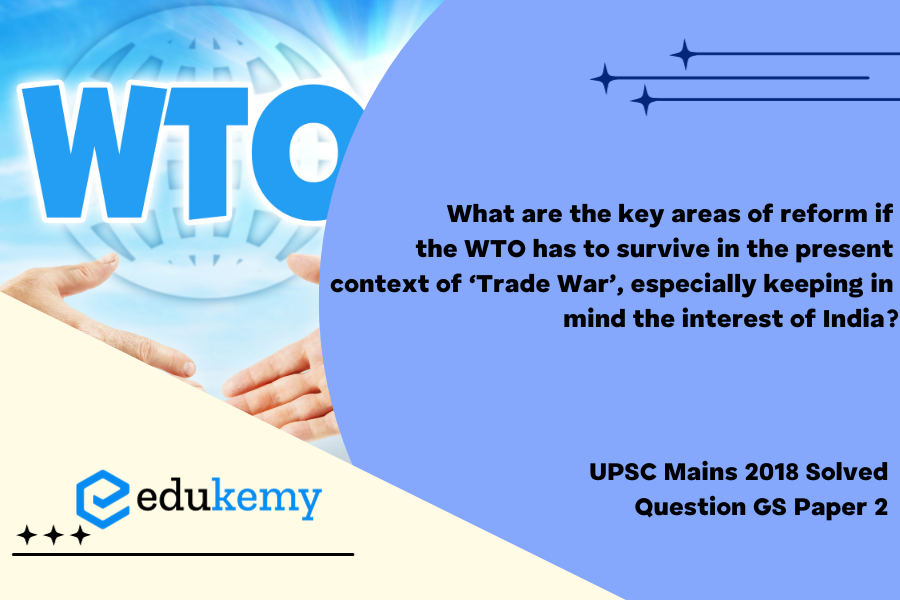In the tumultuous landscape of international trade, the World Trade Organization (WTO) finds itself at a critical juncture, grappling with the challenges posed by the escalating ‘Trade War.’ The global economic order is witnessing unprecedented shifts, marked by protectionist measures, tariff escalations, and geopolitical tensions. For the WTO to not only endure but thrive in this contemporary context, strategic reforms are imperative. With a particular focus on safeguarding the interests of India, several key areas demand attention. These include revitalizing dispute resolution mechanisms to ensure swift and fair resolution of trade disputes, promoting inclusivity by addressing the concerns of developing nations, and fostering transparency in trade policies. Furthermore, a recalibration of rules pertaining to intellectual property rights and subsidies is essential to level the playing field and accommodate the diverse economic landscapes of member states. Additionally, the WTO must adapt to the digital era by addressing e-commerce regulations and digital trade barriers, recognizing the evolving nature of global commerce. Moreover, enhancing the organization’s relevance requires a reevaluation of the decision-making processes to accommodate the dynamic geopolitical realities. As India stands at the crossroads of this global trade upheaval, its strategic interests lie in a WTO that not only survives but evolves into a resilient institution capable of navigating the complexities of the contemporary ‘Trade War’ scenario.
Tag: Important International institutions, agencies, and fora- their structure, mandate.
Contents
Decoding the Question:
- In Introduction, try to briefly write about the WTO and the present trade war.
- In Body,
- Second, discuss the key areas of reform.
- Third, discuss the Indian angle.
- In Conclusion, try to end the answer with India’s future stand.
Answer:
The World Trade Organization (WTO) officially commenced in 1995 after replacing the General Agreement on Tariffs and Trade (GATT). WTO intends to supervise and liberalize international trade. It is the only global international organization dealing with the rules of trade between nations. Its goal is to help producers of goods and services, exporters, and importers conduct their business.
Trade War:
- A trade war is an economic conflict between countries that involves implementing protectionist policies in the form of trade barriers.
- The USA imposes ‘tremendously high’ tariffs on American products like Harley Davidson motorcycles. It also signaled to end the Preferential Trade Status (wherein certain countries are levied zero tariff on certain export products of theirs) given to India and Turkey.
- The US has been raising this demand in the context of countries such as China and India continuing to enjoy ‘Special and Differential Treatment’ (SDT). The recent offer by the President of Brazil to give up on his country’s SDT status has been a shot in the arm for the US.

The key areas of reforms are:
- Dispute Settlement System: There are suggestions regarding bringing transparency, shortening of time frames, permanent panel body, special and differential treatment for developing countries etc. India can benefit from the reforms if proposals specific to developing countries are accepted
- Reducing Trade Costs: Though WTO has come out with Trade Facilitation Agreement (TFA) in this regard, it mainly addresses the trade of goods. India being a major service provider would benefit if reforms are carried out in trade facilitation of services. It is expected that there are considerable economic benefits from the better movement of people across borders.
- Modalities of Negotiations: Some progress has been made, as the ‘single undertaking’ nature of negotiations is all but discarded. There are proposals to make them more flexible.
India is one of the prominent members of WTO and is largely seen as a leader of developing and underdeveloped countries. More than 40% of the Indian economy is exposed to international trade. .India has been pitching for a reformed WTO. India has maintained that it is committed to working alongside other countries to reform the organization in order to ensure that it continues to be an ‘engine for global trade’.
In case you still have your doubts, contact us on 9811333901.
For UPSC Prelims Resources, Click here
For Daily Updates and Study Material:
Join our Telegram Channel – Edukemy for IAS
- 1. Learn through Videos – here
- 2. Be Exam Ready by Practicing Daily MCQs – here
- 3. Daily Newsletter – Get all your Current Affairs Covered – here
- 4. Mains Answer Writing Practice – here


